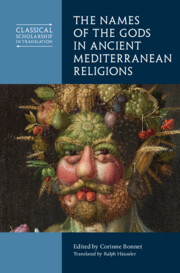Book contents
- The Names of the Gods in Ancient Mediterranean Religions
- Classical Scholarship in Translation
- The Names of the Gods in Ancient Mediterranean Religions
- Copyright page
- Dedication
- Contents
- Figures
- Tables
- Contributors
- Acknowledgements
- Foreword
- Abbreviations
- Introduction In the Mirror of Vertumnus
- Chapter 1 ‘To the Immortals Everything Is Possible’
- Chapter 2 All Sides of the Moon
- Chapter 3 ‘May the Force Be With You!’
- Chapter 4 Dionysos in the Mirror of Poseidon
- Chapter 5 Lord of the Universe, the World and Eternity
- Chapter 6 This Is Not a Name
- Chapter 7 The Sword and the Patera
- Chapter 8 A Travelling Portrait
- Chapter 9 Pantheus, a ‘Total’ God in the Greek and Roman World
- Chapter 10 ‘I Will Be Who I Will Be’ (Exod. 3:14)
- Chapter 11 Golden Locks Among the Greeks, or the Hair Secrets of the Beautiful Apollo
- Chapter 12 Athena – Artemis
- Epilogue
- Bibliography
- Index
Chapter 3 - ‘May the Force Be With You!’
Men and Gods in Battle in the Phoenician World
Published online by Cambridge University Press: 23 February 2024
- The Names of the Gods in Ancient Mediterranean Religions
- Classical Scholarship in Translation
- The Names of the Gods in Ancient Mediterranean Religions
- Copyright page
- Dedication
- Contents
- Figures
- Tables
- Contributors
- Acknowledgements
- Foreword
- Abbreviations
- Introduction In the Mirror of Vertumnus
- Chapter 1 ‘To the Immortals Everything Is Possible’
- Chapter 2 All Sides of the Moon
- Chapter 3 ‘May the Force Be With You!’
- Chapter 4 Dionysos in the Mirror of Poseidon
- Chapter 5 Lord of the Universe, the World and Eternity
- Chapter 6 This Is Not a Name
- Chapter 7 The Sword and the Patera
- Chapter 8 A Travelling Portrait
- Chapter 9 Pantheus, a ‘Total’ God in the Greek and Roman World
- Chapter 10 ‘I Will Be Who I Will Be’ (Exod. 3:14)
- Chapter 11 Golden Locks Among the Greeks, or the Hair Secrets of the Beautiful Apollo
- Chapter 12 Athena – Artemis
- Epilogue
- Bibliography
- Index
Summary
The epigraphic documentation in the Phoenician language of the island of Cyprus makes it possible to approach the exploration of the semantic field of the force (’z) in the conceptual universe of the Phoenicians. Gods ‘of strength’ appear in inscriptions commemorating victories, both at Kition and at Larnaka-tis-Lapithou. Baal and Anat are discussed: the profession of war is not a male prerogative in the world of the gods. Strength is also present in the world of men: anthroponomy conceals a few names, albeit not many, constructed using the root ‘zz ‘to be strong’. At the same time Anat, Resheph, Baal and Mikal, gods present in the Phoenician context of Cyprus with also (but not only) warlike attributes, are implicated in the formation of anthroponyms, most of the time without reference to weapons and shields, if they are only those who serve their worshippers to face the daily battles from the delicate moment of birth onwards.
- Type
- Chapter
- Information
- The Names of the Gods in Ancient Mediterranean Religions , pp. 59 - 70Publisher: Cambridge University PressPrint publication year: 2024

